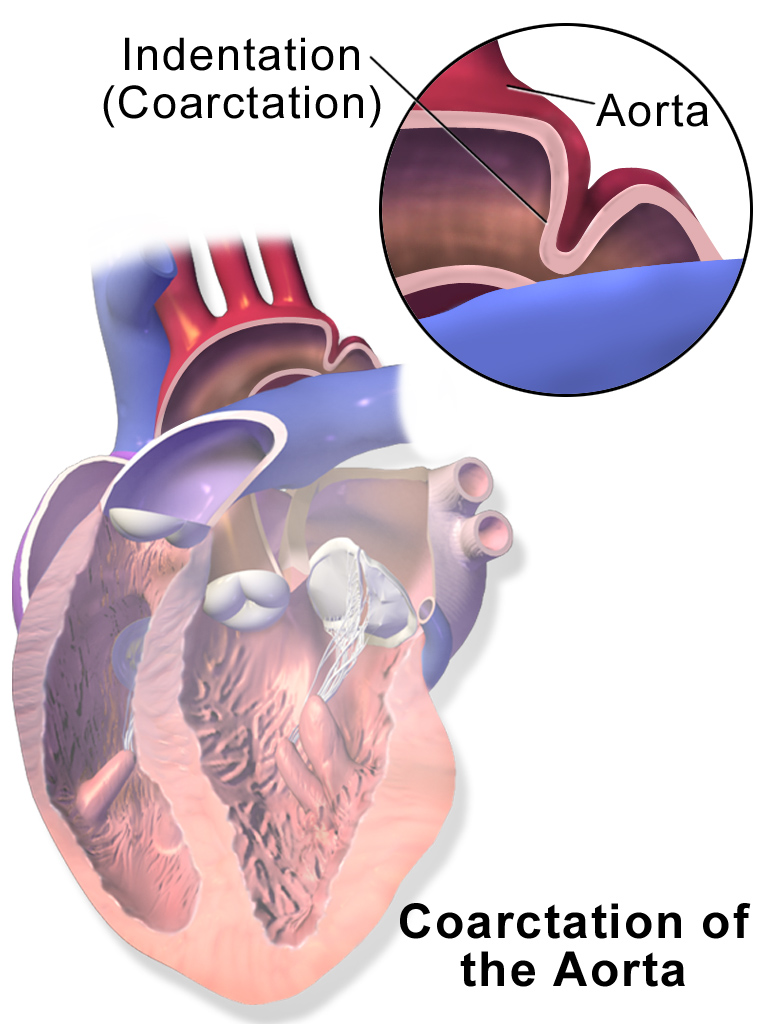Coarctation Of Aorta

Gough (1961) described the anomaly in father and son. He found 6 other reports of familial coarctation. In a systematic study of coarctation, Boon and Roberts (1976) discerned familial aggregation with multifactorial inheritance. Recurrence risks in sibs was about 0.5% for coarctation and 1.0% for any form of congenital heart defect. Beekman and Robinow (1985) described coarctation of the aorta in 4 generations. In 2 members of the family, mother and son, in the third and fourth generations, the coarctation was minimal; in the mother, for example, a gradient in the aorta was demonstrated mainly after peak exercise. Gerboni et al. (1993) found congenital heart disease in 5 members of 3 generations of a family. In 4 of the 5, mild or severe coarctation of the aorta, either isolated or in association with other cardiac defects, was found. In 1 fetus at risk, echocardiography at 26 weeks revealed hypoplastic left heart and severe narrowing of the aortic isthmus, which was confirmed after birth.
Loffredo et al. (2004) ascertained families of 38 probands with hypoplastic left heart (241550), 46 with coarctation of the aorta, and 22 with d-transposition of the aorta (DTGA; 608808), with the latter group serving as 'disease controls.' Cardiovascular malformations were detected more frequently in first-degree relatives of probands with hypoplastic left heart (19.3%) or coarctation of the aorta (9.4%) than among DTGA families (2.7%). Less than 1% of second-degree relatives were affected in all 3 groups. In third-degree relatives, cardiovascular malformations were detected in 1.8% of families with hypoplastic left heart compared to 1.2% in families with coarctation of the aorta and 0.4% in families with DTGA, The predominant types of malformation seen in relatives were left-sided obstructive lesions. Loffredo et al. (2004) stated that this confirmed the familial aggregation of congenital heart defects among infants with hypoplastic left heart and coarctation of the aorta.
The spectrum of left ventricular outflow tract obstruction (LVOTO) consists of hypoplastic left heart or left ventricle, aortic valve stenosis and bicuspid aortic valve (109730), hypoplastic aortic arch, and coarctation of the aorta. Wessels et al. (2005) described 4 families with presumed autosomal dominant inheritance of LVOTO. In these families, LVOTO showed a wide clinical spectrum, with some members having severe anomalies such as hypoplastic left heart and others having only minor anomalies such as mild aortic valve stenosis. Wessels et al. (2005) concluded that their findings supported the suggestion that all anomalies of the LVOTO spectrum are developmentally related and sometimes can be caused by a single gene defect.
McBride et al. (2005) undertook a formal inheritance analysis of LVOTO in 124 families ascertained by an index case with aortic valve stenosis, coarctation of the aorta, or hypoplastic left heart. LVOTO malformations were noted in 30 relatives, along with significant congenital heart defects in 2 others, yielding a total of 32 (7.7%) of 413 relatives. Relative risk for first-degree relatives in this group was 36.9, with a heritability of 0.71 to 0.90. McBride et al. (2005) concluded that their data supported a complex but most likely oligogenic pattern of inheritance.